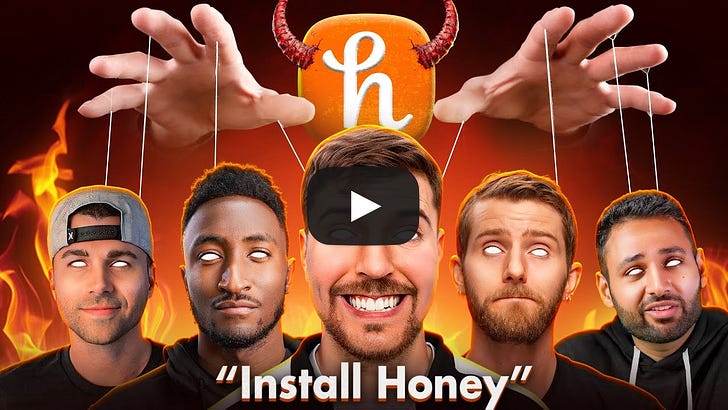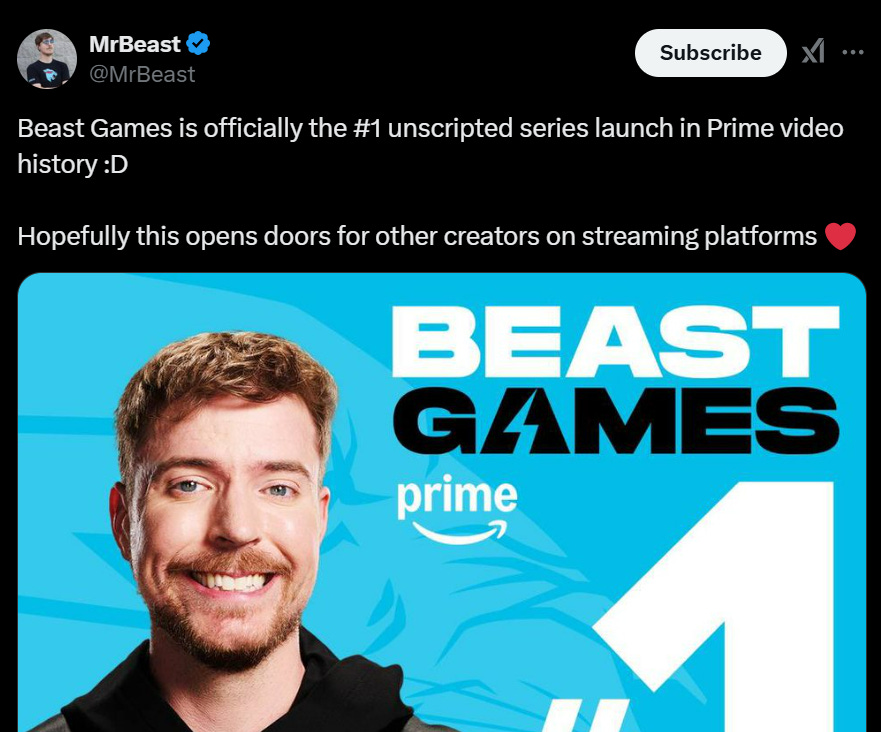Why news publishers will probably never solve their keyword blocking problem
Why news publishers will probably never solve their keyword blocking problemPLUS: Bill Simmons walked so Pat McAfee could runWelcome! I'm Simon Owens and this is my media industry newsletter. If you've received it, then you either subscribed or someone forwarded it to you. If you fit into the latter camp and want to subscribe, then you can click on this handy little button: Let’s jump into it… Why news publishers will probably never solve their keyword blocking problemThe WSJ wrote about the increasingly pervasive problem of adtech keyword blocking, which keeps most programmatic ads off news websites — even when the content is neither controversial or political:
I think the biggest problem for publishers is that advertising supply far outstrips demand, and so brands have absolutely no incentive to place their ads next to political content when they can just reach those same audiences on channels that never ever touch political topics. Ironically, this entire trend of keyword blocking stemmed from the actions of a few well-meaning progressive groups who started screenshotting display ads on right wing websites and then tweeted them at the brands associated with those ads; this led to many of those brands blocking right wing hate sites in their ad buys. But whereas those progressive groups probably hoped that their campaigns would force brands to be more selective in their ad buys, what actually happened was that adtech companies simply rolled out keyword blocking tools. That's because ad agencies are still incentivized toward scale and arbitrage, and hand-selecting a few premium publishers provides neither. So this leaves news publishers in a bit of a pickle: how do you incentivize advertisers into paying a premium for your advertising inventory when they can simply reach your audience elsewhere? When you factor in that display ads aren't very effective anyway, then you'll quickly realize that these publishers have neither the carrot nor the stick to force brands back to the table. That's why none of them have really solved this problem even though the trend has been apparent for years. How PayPal might be siphoning away your affiliate revenueWow, this is extremely fucked up. Honey, a free browser extension owned by PayPal, sponsored a bunch of huge creators to promote its product, which ostensibly scours the internet for discount codes in order to find the best deals. But once you've downloaded the extension, Honey basically swaps out all affiliate links with its own affiliate links. So if a creator gets their followers to click on a product link and purchase it, they get absolutely no commission while Honey, which did absolutely none of the work of driving the sale, gets the entire commission.  This has huge ramifications. It potentially affects any creator or publisher that uses affiliate links — regardless of whether they've even heard of Honey. Some think Honey may have siphoned away tens of millions of dollars from publishers, if not more. If you monetize with affiliate links and saw an unexplained drop off in revenue, Honey may well be the culprit. What’s especially amazing is that this scam has been mostly ignored so far by the mainstream media and is almost exclusively being covered by creators. I just did a search on Google News for “Honey” and “Browser” and only a handful of legacy media outlets have taken notice. The New York Times, for instance, has a huge affiliate business through its Wirecutter site, and yet as far as I can tell it hasn’t so much as mentioned it. I can’t find any evidence that the Washington Post, LA Times, The Guardian, The Wall Street Journal, or CNN have covered it either. Do sports teams underpay their social media managers?If you’re really into watching pro sports, you’ve probably noticed that many teams have built up their internal media teams to give fans more access to the players. It turns out that the social media managers who operate these teams’ accounts are underpaid compared to those in other industries:
What the success of MrBeast’s Amazon show means for other creatorsMrBeast claims his Amazon Prime show is the "#1 unscripted series launch in Prime video history." That sounds good, but what does it even mean? Was Amazon even heavily invested in unscripted programming originally? I know Netflix has gone big on reality TV, but I'm struggling to think of any breakout reality shows on Amazon. So that may have been a low bar to clear. Many view the success or failure of Beast Games as a bellwether as to whether creators can succeed in traditional Hollywood. Previous experiments with creator-led shows have seen mixed results, but in many of those cases there was lots of meddling from studio executives. In this particular instance, MrBeast had complete creative control over the show. Spotify rolls out more creator-friendly monetization policiesSpotify officially launched its podcast partnership program. It's only available to podcasters who upload their episodes directly to the platform, and it pays out a 50% revenue share for all ads that are inserted into episodes. There's an eligibility requirement — 10,000 streams and at least 2,000 unique listeners in the past month — but I think that's a good thing. It weeds out the bad actors who might try to upload thousands of low-quality podcasts, and it also ensures participating partners get a bigger chunk of revenue. There's still not a great way for podcasters to tap into Spotify's massive subscription revenue, though. Currently, their only way of doing so is by uploading video versions of their podcasts, but video watching likely makes up a tiny percentage of overall podcast consumption on Spotify. My guess is that the music labels still wield a lot of influence and they'd balk at the notion of their payouts being siphoned away from podcasters. Musicians already love making a stink over the claim that their streaming payouts are too low — a claim I don't really agree with — and they'd love nothing more than to launch a fresh round of attacks the moment there's any perception that Spotify might cut their earnings. Still though, Spotify deserves credit for being one of the few major tech platforms to develop a clearly-defined, meaningful revenue share for creators. That's more than can be said for TikTok, Meta, Snapchat, and virtually every other huge platform other than YouTube. Please don’t take my newsletter and podcast for grantedI rely on paid subscriptions for the vast majority of my revenue. Without enough paid subscribers, I can’t continue justifying spending 40+ hours a week on my newsletter and podcast, and I’ll need to shut them down so I can seek out other work. Let me put this another way: if you’d be disappointed if I suddenly announced that I’m shutting down my newsletter and podcast — a very real possibility — then you should probably subscribe. Seriously, it’s only $100 for a full year, and if you’re using insights from my content to improve your own business, then that $100 pays for itself. And if you use the link below, you get 20% off for the first year: Why didn’t Gannett ever launch a local/national news bundle?Reuters and Gannett just announced a new partnership that will allow the former to syndicate content from the latter:
What's always flummoxed me is why Gannett never went for the low-hanging fruit of bundling its national news content (USA Today) with its local content across hundreds of newspapers. Here's how it would work: Gannett would move all its newspapers under a single domain and then sell a bundled subscription that gives you access to both USA Today and its entire network of local news sites. That kind of bundle would drive massive value for the average news consumer and would allow Gannett to differentiate its offerings from other national outlets like the Washington Post and New York Times. This Reuters deal sort of adopts this framework, but it makes Gannett reliant on an outside company and weakens the direct connection it has with its subscriber base. Why does it need Reuters to execute a strategy that it could have adopted years ago? After I posted about this on social media, I received a reply from Paul Soldera:
Here was my response to Paul’s thoughtful comment:
Every sports league wants to run its own media operations nowWe're seeing more and more professional sports leagues beef up their in-house media capabilities, not only to produce even more content, but also to aid the big tech streamers that have lots of money to shell out for broadcast rights but no internal capacity to film the games and matches:
Why is YouTube shipping broken AI tech?So apparently YouTube rolled out a back-end tool that allows its top creators to reply to comments on their videos with AI-generated responses. The video essayist Drew Gooden documented with meticulous detail how terrible this tool is at generating appropriate responses:  It’s incredibly easy to become inured to all the AI slop that’s seeping into every part of the internet, but sometimes you see something so shocking that it jolts you into the realization that tech companies with market caps north of a trillion dollars are regularly shipping products that just don’t work a huge percentage of the time. Imagine if you bought a TV or a laptop or a blender and you didn’t know whether the product would actually turn on when you plugged it in. Most companies with that much of an error rate would quickly go bankrupt. But somehow we carved out this huge exception for AI tools where we’re just expected to shrug and move on. I guess one counterargument is that many of these AI tools are integrated into free products and therefore the analogy doesn’t work, but there are actually plenty of paid SaaS products that have shoved AI chatbots into their UI, and some even use these chatbots as a justification to raise their prices. Google is putting all of its eggs in Reddit’s basketTedium highlighted a niche blogger who successfully raised the alarm this year about Google downgrading niche, knowledgeable websites in its search results and replacing them with low-quality publishers:
Something weird is going on with Google right now. On the one hand, huge news sites are seeing their affiliate content dropping from the front page of search results. Google has issued statements that it's simply punishing sites that syndicate third-party content that's unrelated to their newsgathering operations, but I've also seen complaints from publishers who produce all their affiliate content in-house and have still seen a drop-off in Google traffic. In fact, one media operator I spoke to suspects that Google is punishing their site because they use freelancers instead of full-time staff writers to write their content. How Google's algorithm can tell the difference between a freelancer and staffer is beyond me. At the same time, the operators behind several niche sites say they've also seen their Google traffic crater. I saw a viral post a few weeks ago from a film news website that had to lay off its entire staff and pivot to YouTube due to massive downranking in Google. That article sparked a large outcry from other independent publishers that said they experienced a similar fate. So who's benefiting from all these shifts? As far as I can tell, it's Reddit. The platform just had a blockbuster year in terms of advertising revenue and traffic, and that success seems to stem from a substantial increase in its Google traffic. While the site excels at cultivating niche communities and sorting comments by quality — two attributes that make it great for answering search queries — I can't imagine it's good for Google's longterm health that it's put all its eggs into one basket, especially a basket that relies entirely on unpaid, anonymous contributions. I wouldn't be surprised if Reddit becomes a magnet for bad actors who aim to exploit its high search rankings to drive traffic to dubious products. Bill Simmons walked so Pat McAfee could runPuck wrote about ESPN’s ongoing talent negotiations and its attempts to identify “needle movers” who will entice viewers into flipping on the channel:
Pat McAfee's deal with ESPN is incredibly unique within the broadcast world. He basically operates an independent YouTube channel and simply licenses it, non-exclusively, to ESPN for $17 million. He's so independent, in fact, that he's brazenly criticized top ESPN brass with little pushback. Compare this to an earlier era when the network employed Bill Simmons. Like McAfee, Simmons also forged a direct relationship with his audience via his hit podcast, and he proved himself incredibly adept at attracting and managing talent when he ran Grantland. This didn't stop ESPN from regularly punishing him every time he failed to toe the line, so much so that he eventually quit. We all know what happened next: he founded The Ringer and eventually sold it to Spotify for a whopping $250 million. Not only that, but The Ringer continues to be the crown jewel in Spotify's podcast network. There's no question that Simmons was vindicated. Which brings me back to the McAfee deal. It seems like a tacit recognition that ESPN's approach to talent management needs to change in an era when anyone can steal market share with a simple podcast or YouTube channel. Invite your friends and earn rewardsIf you enjoy Simon Owens's Media Newsletter, share it with your friends and earn rewards when they subscribe. |
Older messages
There’s more room for niche “Morning Brew for X” newsletters
Friday, December 20, 2024
PLUS: Does Substack help creators with audience growth? ͏ ͏ ͏ ͏ ͏ ͏ ͏ ͏ ͏ ͏ ͏ ͏ ͏ ͏ ͏ ͏ ͏ ͏ ͏ ͏ ͏ ͏ ͏ ͏ ͏ ͏ ͏ ͏ ͏ ͏ ͏ ͏ ͏ ͏ ͏ ͏ ͏ ͏ ͏ ͏ ͏ ͏ ͏ ͏ ͏ ͏ ͏ ͏ ͏ ͏ ͏ ͏ ͏ ͏ ͏ ͏ ͏ ͏ ͏ ͏ ͏ ͏ ͏ ͏ ͏ ͏ ͏ ͏ ͏ ͏ ͏ ͏ ͏
How the Money for the Rest of Us podcast built a six figure membership platform
Thursday, December 19, 2024
Founder David Stein also launched a data-rich investing app. ͏ ͏ ͏ ͏ ͏ ͏ ͏ ͏ ͏ ͏ ͏ ͏ ͏ ͏ ͏ ͏ ͏ ͏ ͏ ͏ ͏ ͏ ͏ ͏ ͏ ͏ ͏ ͏ ͏ ͏ ͏ ͏ ͏ ͏ ͏ ͏ ͏ ͏ ͏ ͏ ͏ ͏ ͏ ͏ ͏ ͏ ͏ ͏ ͏ ͏ ͏ ͏ ͏ ͏ ͏ ͏ ͏ ͏ ͏ ͏ ͏ ͏ ͏ ͏ ͏ ͏ ͏ ͏ ͏ ͏
This politics newsletter was almost destroyed by Facebook's algorithm changes
Thursday, December 19, 2024
Ben Cohen saved The Daily Banter by pivoting from advertising to a subscription-based business model. ͏ ͏ ͏ ͏ ͏ ͏ ͏ ͏ ͏ ͏ ͏ ͏ ͏ ͏ ͏ ͏ ͏ ͏ ͏ ͏ ͏ ͏ ͏ ͏ ͏ ͏ ͏ ͏ ͏ ͏ ͏ ͏ ͏ ͏ ͏ ͏ ͏ ͏ ͏ ͏ ͏ ͏ ͏ ͏ ͏ ͏ ͏ ͏ ͏ ͏
The Creator Economy's paradigm shift
Thursday, December 19, 2024
PLUS: Podcasts are dominating the television screen. ͏ ͏ ͏ ͏ ͏ ͏ ͏ ͏ ͏ ͏ ͏ ͏ ͏ ͏ ͏ ͏ ͏ ͏ ͏ ͏ ͏ ͏ ͏ ͏ ͏ ͏ ͏ ͏ ͏ ͏ ͏ ͏ ͏ ͏ ͏ ͏ ͏ ͏ ͏ ͏ ͏ ͏ ͏ ͏ ͏ ͏ ͏ ͏ ͏ ͏ ͏ ͏ ͏ ͏ ͏ ͏ ͏ ͏ ͏ ͏ ͏ ͏ ͏ ͏ ͏ ͏ ͏ ͏ ͏ ͏ ͏ ͏ ͏ ͏
The newsletter platform wars heat up
Thursday, December 19, 2024
PLUS: Twitch vs Youtube Streaming Revenue ͏ ͏ ͏ ͏ ͏ ͏ ͏ ͏ ͏ ͏ ͏ ͏ ͏ ͏ ͏ ͏ ͏ ͏ ͏ ͏ ͏ ͏ ͏ ͏ ͏ ͏ ͏ ͏ ͏ ͏ ͏ ͏ ͏ ͏ ͏ ͏ ͏ ͏ ͏ ͏ ͏ ͏ ͏ ͏ ͏ ͏ ͏ ͏ ͏ ͏ ͏ ͏ ͏ ͏ ͏ ͏ ͏ ͏ ͏ ͏ ͏ ͏ ͏ ͏ ͏ ͏ ͏ ͏ ͏ ͏ ͏ ͏ ͏ ͏ ͏ ͏ ͏ ͏ ͏ ͏
You Might Also Like
GeekWire 200 CEO survey | Amazon’s entry in the quantum race
Thursday, February 27, 2025
All-woman crew will join Blue Origin's next suborbital spaceflight ADVERTISEMENT GeekWire SPONSOR MESSAGE: SEA Airport Is Moving from Now to WOW!: Take a virtual tour of what's coming.
😑 How your tax season just got more annoying
Thursday, February 27, 2025
While raking in campaign cash from tax prep companies, the GOP is trying to kill a free filing system and gut IRS customer service. 🔥 Today's Lever story (attached below): What happens when you
☕ Show time
Thursday, February 27, 2025
How A24 brought the play central to “Sing Sing” to life for awards season. February 27, 2025 View Online | Sign Up Marketing Brew presented by Future Cardia It's Thursday. TikTok may be back in app
☕ Pin in the game
Thursday, February 27, 2025
Pinterest's shopping transformation. February 27, 2025 View Online | Sign Up Retail Brew Presented By AT&T Connected Spaces Hello, it's Thursday. In a recent survey by the American Customer
The Trump-Zelensky mineral rights deal.
Thursday, February 27, 2025
Plus, would tariffs on Canadian energy imports hurt US consumers? The Trump-Zelensky mineral rights deal. Plus, would tariffs on Canadian energy imports hurt US consumers? By Isaac Saul • 27 Feb 2025
537500 is your Substack verification code
Thursday, February 27, 2025
Here's your verification code to sign in to Substack: 537500 This code will only be valid for the next 10 minutes. If the code does not work, you can use this login verification link: Verify email
DOGE Said It Cut $232 Million From Social Security Budget. It Was Only About Half a Million.
Thursday, February 27, 2025
The cut, an anti-trans attack, was the latest example of confusion sown by bold claims that wither under scrutiny. Most Read DOGE Said It Cut $232 Million From Social Security Budget. It Was Only About
Mushroom Font
Thursday, February 27, 2025
Is God A Mushroom? // The Hardest Working Font In Manhattan Mushroom Font By Caroline Crampton • 27 Feb 2025 View in browser View in browser Is God A Mushroom? John Last | Long Now | 26th February 2025
⚔️ ‘Witcher 4’ Devs Reveal New Details
Thursday, February 27, 2025
Plus: James Gunn just pointed out Marvel's biggest problem — again. Inverse Daily A new behind-the-scenes video on The Witcher 4's reveal trailer gives us a few hints at what the development
Is the EU drifting right and being cut adrift?
Thursday, February 27, 2025
+ Gene Hackman, an actor's actor

